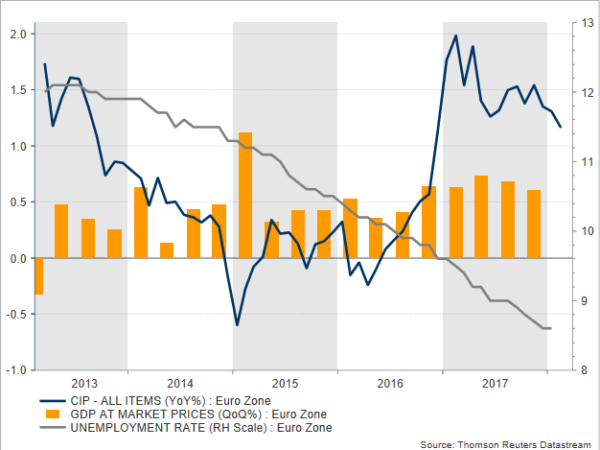The European Central Bank concludes its two-day policy meeting on Thursday, but no major policy shift is expected once again. February did not add much to the Eurozone’s economic recovery but instead indicated that the bloc’s positive momentum has slowed down. March did not have a great start either, with political uncertainties lingering on, while threats of a trade war arose out of the blue.
The ECB Governor, Mario Draghi, is anticipated to say on Thursday that the current loose monetary policy is still needed to accommodate healthy growth in the Eurozone, keeping interest rates at record lows for the second year running (1045 GMT) and signalling that it is not yet time to consider an early exit from the central bank’s quantitative easing program as some in his board desire. Commenting on data, he will probably remind markets about the weak inflation environment. Indeed, the consumer price index – the ECB’s preferred inflation measure – has stuck below the ECB’s target of 2.0%, retreating to 1.3% y/y in January, while initial estimates for February signaled that inflation might have eased further to 1.2%. At this point, he might cite the recent strength in the exchange rate as a headwind to price growth. But as he previously said, he might also argue that the factors that restrict inflation from rising towards the goal will probably fade out as the unemployment rate continues to fall and economic expansion rises.

Germany’s political gridlock has finally come to an end during the weekend, with Merkel securing another term as chancellor under a grand coalition agreement with her former coalition partners, the SPD. At the same day though, the Italian elections favored Eurosceptic parties more than anticipated, bringing a new headache to the EU. The anti-immigration far-right Five Start Movement party turned to be the largest single party with 32.1% of the votes and has now the right to negotiate a leading position in the new government. Still, Draghi might give little weight on this front as this is a story heard before.
The announcement of new punitive import tariffs on steel and aluminum on Friday caught markets by surprise and will undoubtedly be raised for discussion at Draghi’s press conference at 1330 GMT. While there are still some rumors supporting that the measures are a way to advance Trump’s negotiating position (probably bringing a better NAFTA deal for the US on the table) rather than something that could turn real, Gary Cohn’s resignation – Trump’s chief economic advisor and free-trade advocate – late on Tuesday sparked fears that tariffs are not unlikely to happen. This could spread economic pain to European auto industries, deteriorating the bloc’s terms of trade. Therefore, as long as the issue continues to weigh on business sentiment, the ECB will probably keep its hands in its pockets. Recall that the Sentix index, which gauges investors’ confidence on the bloc’s economic performance for the next six months, retreated near one-year lows in February.
ECB minutes regarding January’s meeting stated that a shift in forward guidance was at that moment premature and that “the language pertaining to the monetary policy stance could be revisited early this year. Policymakers are likely to repeat this wording tomorrow as well, with investors now expecting a change in forward guidance occurring probably in April or June, while they also believe that policymakers could set an end-date for the QE program and reveal plans on interest rates by September. However, if they hold a more cautious stance tomorrow than is already priced in, euro/dollar could easily lose ground to meet again the 1.23 key mark or even worse deep below the 50-day moving average which currently stands at 1.2258. Alternatively, if they feel more confident about the bloc’s economic outlook despite the aforementioned uncertainties, the pair could crawl up towards the three-year high of 1.2555.